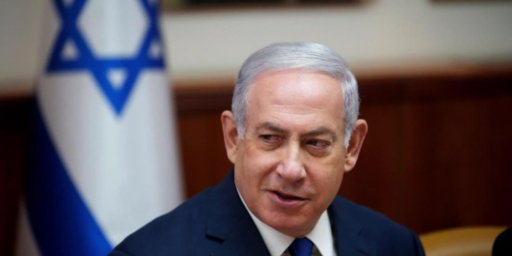U.S. Puts Its Thumb On The Scale In The Middle East, Again
Recent comments by the U.S. Ambassador to Israel make it clear that the United States cannot be considered a neutral party In the Middle East peace process.

The United States is once again proving that it can no longer be considered an honest broker in the Middle East peace process. This time it’s thanks to remarks to the U.S, Ambassador to Israel saying that Israel has a right to annex the West Bank:
JERUSALEM — Israel has a right to annex at least some, but “unlikely all,” of the West Bank, the United States ambassador, David M. Friedman, said in an interview, opening the door to American acceptance of what would be an enormously provocative act.
Prime Minister Benjamin Netanyahu has promised to begin annexing Jewish settlements in the West Bank, a move that would violate international law and could be a fatal blow to a two-state solution to the Israeli-Palestinian conflict.
“Under certain circumstances,” Mr. Friedman said, “I think Israel has the right to retain some, but unlikely all, of the West Bank.”
In a wide-ranging interview at his Jerusalem residence last week, Mr. Friedman also accused Palestinian leaders of wrongheadedly using “massive pressure” to deter business leaders from attending an economic conference that the administration is organizing this month in Bahrain, where it hopes to impress upon them the financial windfalls they can expect if they embrace the administration’s peace plan.
And he said that the long-awaited Trump peace plan was aimed at improving the quality of life for Palestinians but was unlikely to lead quickly to a “permanent resolution to the conflict.”
But it was on annexation that Mr. Friedman’s remarks were likely to be read most closely. Mr. Netanyahu promised just before Israel’s April 9 election to begin annexing part of the West Bank, which Israel captured in 1967.
Much of the world considers Israeli settlements there illegal and would view annexation as compounding the crime. Israeli critics, including a group of respected former military and national-security officials, warn that annexation could lead to violence and require the military to occupy Palestinian urban areas for the first time in decades.
Mr. Friedman declined to say how the United States would respond if Mr. Netanyahu moved to annex West Bank land unilaterally.
“We really don’t have a view until we understand how much, on what terms, why does it make sense, why is it good for Israel, why is it good for the region, why does it not create more problems than it solves,” Mr. Friedman said. “These are all things that we’d want to understand, and I don’t want to prejudge.”
He accused the Obama administration, in allowing passage of a United Nations resolution in 2016 that condemned Israeli settlements as a “flagrant violation” of international law, of giving credence to Palestinian arguments “that the entire West Bank and East Jerusalem belong to them.”
“Certainly Israel’s entitled to retain some portion of it,” he said of the West Bank.
Mr. Friedman, 60, who before taking his post was Mr. Trump’s top bankruptcy lawyer and a generous supporter of the Israeli settlement enterprise, is said to be a driving force within the administration’s Middle East team, which also includes Jared Kushner, Mr. Trump’s son-in-law and senior adviser, and the special envoy Jason Greenblatt, a former in-house counsel at the Trump Organization.
(…)
The Trump administration has not publicly presented its peace plan, but it has portrayed the Bahrain conference as a prelude to the plan’s first phase, which would focus on economic development of the occupied territories. It would be followed by a second phase focused on a political solution.
Palestinian leaders have rejected the idea, saying there can be no economic peace without a political solution, and that they do not trust any plan from the Trump administration, which has taken actions to favor Israel in the conflict. They also deny that they have pressured businesspeople to boycott the Bahrain conference.
A major American supporter of the Israeli settlement enterprise before his appointment, Mr. Friedman has seldom been accused of being evenhanded as ambassador. Asked if he shared the view of many right-wing Israelis that Palestinians bore the brunt of the blame for the failure to reach a settlement of the conflict, he said, “There’s more blame on the Palestinian side,” but allowed that Israel had “made its own mistakes.”
“There were some extraordinarily generous proposals made to the Palestinians that they turned down,” he added.
He had harsh words for the Palestinian Authority, saying it had “a very, very poor track record on human rights” and that its institutions “don’t give anyone in the region sufficient comfort that Palestinian autonomy is not threatening.”
“The Palestinian leadership is really the difficulty right now,” he said.
He defended what has been an all-stick, no-carrot approach to the Palestinians. He said this was “reality-based” and responsive to hostile Palestinian rhetoric and actions. “They brought those sticks upon themselves,” he said, noting that he had been called a “son of a dog” by the Palestinian Authority president, Mahmoud Abbas.
These comments don’t really come as a surprise, of course, Friedman has long been a supporter of Israel and in particular of the hard-line policies of the Likud government led by Prime Minister Benjamin Netanyahu. Additionally, this Administration has repeatedly put its thumb on the scale in Israel’s favor ever since taking power in 2017.
The best example of that came early in Trump’s Presidency when he followed through on his campaign promise to move the United States Embassy in Israel from its historic location in Tel Aviv to Jerusalem. This was a move that pretty much every Middle East expert said was a bad idea unless and until there is a final peace deal between Israel and the Palestinians. More recently, Trump stated on Twitter that he had taken Jerusalem “off the table,” a comment he repeated when he met with Israeli Prime Minister Benjamin Netanyahu during the World Economic Forum in Davos, Switzerland last year. Yet another example can be found in Vice-President Pence’s speech to the Knesset in January 2018 in which he said to Israeli officials and the public that “your cause is our cause, your values are our values, and your fight is our fight.” Additionally, the Trump Administration has cut off aid to the Palestinian government in the West Bank and Gaza that had been in place since the George W. Bush Administration and closed the Palestinian diplomatic office in Washington, D.C. Added to all of that we now have these comments from the American Ambassador to Israel which, unless the State Department says otherwise, must be taken as reflecting official U.S. policy.
Taking all of these actions together, it would be natural for the Palestinians to distrust anything coming out of the Trump Administration in the way of a “peace plan,” especially one being put together by an utter amateur like Jared Kushner whose family has a financial interest in the expansion of Israeli control over the West Bank. Because of all of this, there is no longer any reason for them to believe that the United States is any kind of an unbiased middle man in any peace negotiations, at least not as long as it’s led by this President.






I’ve asked this before, though I’m not sure if it was in this forum, but what does the US get out of its relationship with Israel? I mean other than the enmity of everyone else in the Middle East.
I just cannot comprehend the unreserved support for the Israeli government.
I ask this in all seriousness. They must have some real dirt on us.
@Michae:
I assume intelligence on various Arab countries in the region, perhaps also on Iran and Pakistan. This would have been far more valuable during the Cold War, when some of these countries were aligned with the Soviet Union (though they were not Communist themselves) and used actual Soviet weapons in the battlefield.
@Michae:
“what does the US get out of its relationship with Israel? I mean other than the enmity of everyone else in the Middle East.”
Historically, politicians supported Israel because there were more Jewish voters than Arabic ones, and far more campaign contributions from Jews than Arabs. That may be changing, as many American Jews are feeling alienated by the positions taken by Israel, especially under Netanyahu. Instead, the most fervent supporters of Israel today are fundamentalist Christians.
I wonder if anyone in the early days of Israel’s founding and creation ever thought that the Israelis themselves would turn into the occupiers and the Goliath against the Palestinian David…what a perverse relationship evangelicals have with Israel…but I’m sure that Likud and their ilk are happy to exploit that relationship…after all, they don’t believe in the Christian End Times…